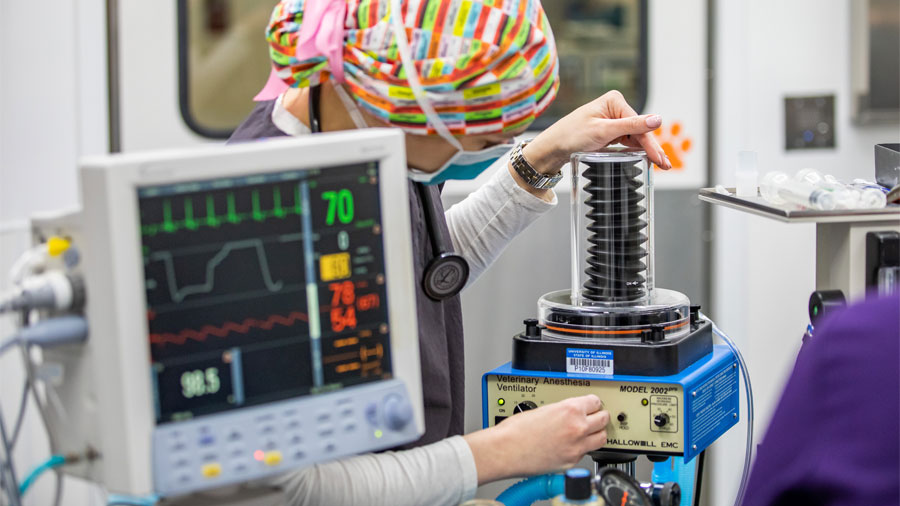This one’s for all the gentle giants, dashing Danes, and persnickety pinschers. Owners frequently tell others about their dog’s “big heart.” But what if that is not a reference to the dog’s lovable personality? Dr. Sumana Prabhakar, a veterinarian who is pursuing specialization in cardiology at the University of Illinois College of Veterinary Medicine, helps explain dilated cardiomyopathy, a situation where a “big heart” is not a good thing.
Dilated cardiomyopathy (DCM) affects the muscles of the heart so that they no longer contract forcefully enough to adequately pump blood. This results in an enlargement of the heart, which in turn further impairs the heart’s ability to contract. As this negative cycle continues, the patient becomes increasingly likely to develop congestive heart failure. If congestive heart failure develops, patients will require daily medication and frequent veterinary appointments to monitor their disease.
Who Gets DCM?

Large breed dogs, such as Doberman pinschers, great Danes, and boxers, that are middle-aged or older are predisposed to developing DCM. Dr. Prabhakar recommends screening dogs for the disease if they have a family history of DCM or a predisposition due to their breed.
Factors other than breed may play a role in dogs developing DCM. Over the past few decades, veterinary researchers have published data supporting a link between certain diets and DCM.
“These diets are often labeled ‘grain-free’ since they use peas, lentils, other legumes, and potatoes as the main ingredient,” explains Dr. Prabhakar. She suggests that dog owners avoid feeding “grain-free” and other diets containing legumes.
What Does DCM Look Like?
DCM is different from other cardiac diseases because it may be present for a long time before the patient shows clinical signs, according to Dr. Prabhakar. Even though the patient appears healthy, the disease is present and progressing.
Clinical signs can vary widely between patients with DCM. The first symptoms may be exercise intolerance or lethargy. Patients who have progressed to congestive heart failure can suffer from coughing, collapse, and respiratory distress.
“Unfortunately, in some dogs, sudden collapse and even death could be the first sign that anything is wrong,” said Dr. Prabhakar. “For this reason, screening for DCM and monitoring for progression of the disease are vitally important.”
Because DCM affects the heart muscle, it can also cause abnormal heart rhythms, called arrhythmias. Arrhythmias originate in the ventricles, the parts of the heart that pump blood to our lungs and throughout our bodies. In DCM, arrhythmias can occur at the same time or even before changes in the shape and musculature of the heart, Dr. Prabhakar says.
Managing DCM
DCM cannot be cured, but the disease can be managed. “The goals of therapy are to improve the heart’s ability to contract, improve clinical signs such as being tired and out of breath, and delay onset of congestive heart failure,” says Dr. Prabhakar.
Oral medications are used to improve the efficiency of the heart’s contractions and promote forward flow of blood. Patients with congestive heart failure require additional oral medications to decrease fluid accumulation.
“The long-term prognosis for canine DCM can be extremely variable, with some patients rapidly progressing to congestive heart failure and requiring therapy while others remain stable for years,” says Dr. Prabhakar. Once congestive heart failure develops, however, patients usually have a poor prognosis. Doberman pinschers also seem to deteriorate more rapidly than other breeds according to Dr. Prabhakar.
Hope for the Future
Having an animal with dilated cardiomyopathy can be scary, but researchers are working on a better treatment. Dr. Prabhakar is part of a study that evaluates the use of a drug called rapamycin in patients with DCM. Called the REPAIR study, this multi-clinic clinical trial seeks to determine if rapamycin will reduce cardiac size and improve contractility in dogs with DCM.
“Rapamycin treatment has been shown to reverse age-related declines in cardiac function in both laboratory animals and client-owned dogs, without significant adverse effects,” says Dr. Prabhakar.
To learn more about the clinical trial, visit the Clinical Trials page of the College of Veterinary Medicine website: vetmed.illinois.edu/research/clinical-trials/
By Alaina Lamp




